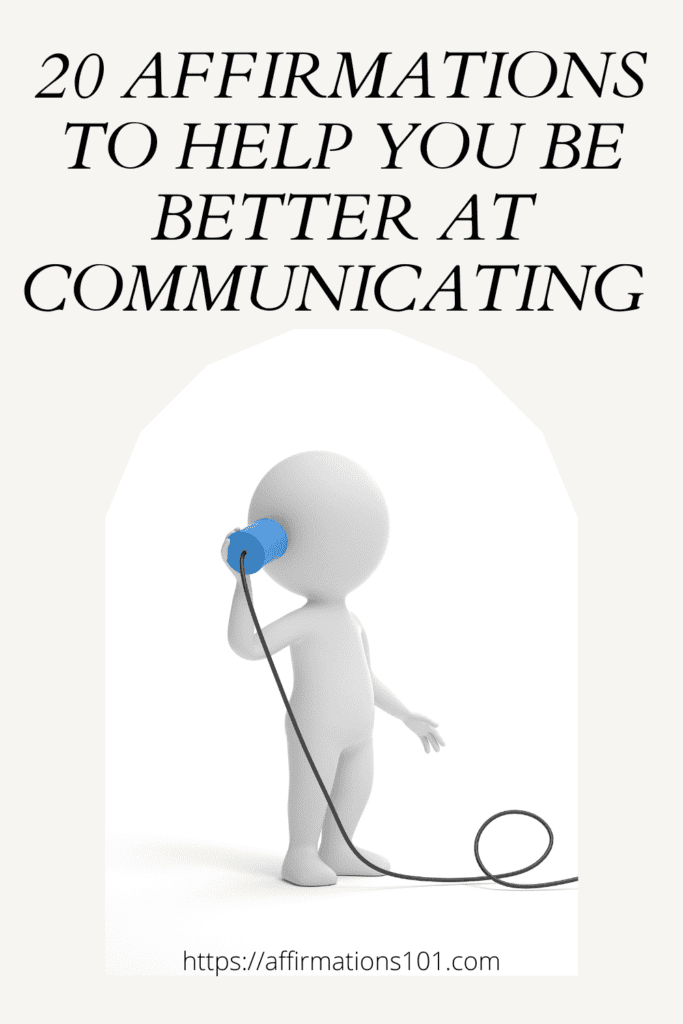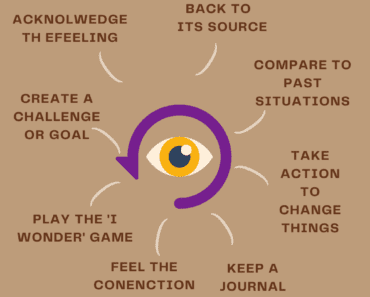If you want to get better at communicating your thoughts, feelings, and beliefs in a way that people respect and want to engage with, then it’s very important to affirm a few things to yourself. You need to adopt a few beliefs and habits that will help you be better at communicating.
20 Affirmations To Use To Be Better At Communicating

1. I Am A Better Communicator Than I Was Yesterday
First, it’s important to believe that you are communicating better every day.
The ability to communicate effectively is a fundamental life skill. After all, we rely on communication to interact with others, build relationships, and exchange information. However, communicating effectively is not always easy, and it is something that we often have to work at.
One of the best ways to improve our communication skills is to believe that we are getting better each day. When we have this mindset, we are more likely to be open to feedback and willing to try new things.
We are also less likely to dwell on past mistakes or get discouraged when we don’t achieve our goals immediately.
Instead, we’ll view each day as an opportunity to learn and grow.
Over time, this positive attitude will lead to real progress in our ability to communicate effectively.
2. I Listen With The Intention To Understand, Not Reply
Listening with the intention to understand is a key communication skill. When we listen with the intent to understand, we are trying to comprehend the speaker’s feelings, thoughts, and experiences. This type of listening allows us to see things from another person’s perspective and can help build trust and rapport.
It can also prevent miscommunications and misunderstandings.
On the other hand, listening with the intention to reply is often focused on coming up with a response or counterargument. This can lead to interrupting or talking over the other person, which can make them feel unheard and devalued.
If you want to improve your communication skills, try to listen with the intention of understanding instead of responding. This will help you to better understand the other person and build strong relationships.
3. I Am Patient When Communicating With Others
When it comes to communication, patience is a virtue.
Whether you’re trying to communicate with a friend, family member, or co-worker, taking the time to listen carefully and thoughtfully respond can go a long way.
In our fast-paced world, it’s easy to fall into the habit of trying to quickly get our point across without really considering the other person’s perspective. However, this can often lead to miscommunication and conflict.
By being patient and taking the time to truly understand what the other person is saying, we can avoid misunderstandings and build stronger relationships.
Furthermore, patience also shows respect for the other person and conveys that we value their opinion. When we rush through conversations or cut people off mid-sentence, it sends the message that we don’t really care about what they have to say.
So next time you’re tempted to speak too quickly or answer before someone has even finished asking their question, try to pause and count to 10. You may be surprised at how much more effective your communication becomes.
4. I Always Communicate With Kindness And Respect
One of the foundations of good communication is treating others with kindness and respect. When we communicate with others, we want them to feel valued and heard.
One way to show that we value someone is by speaking to them politely and using language that is not offensive or hurtful. This doesn’t mean that we need to avoid difficult conversations or topics – but it does mean taking care to choose our words carefully, and to always speak from a place of respect.
When we communicate with kindness and respect, we create an environment where open and honest communication can flourish.
And when we can communicate openly and honestly with each other, we can build strong relationships, solve problems more effectively, and create a more positive world for everyone.
5. I Ask Questions While Communicating
This is one of those affirmations that can really help us become better at communicating, but we don’t often think of.
If we want to communicate better as a whole, it is important to ask questions. Questions help to encourage open and honest communication by giving the other person a chance to share their thoughts and feelings.
They also help to build rapport and trust between people.
By asking questions, we can learn more about the other person, and we can better understand their perspective.
Asking questions is an essential part of effective communication, and it can help us to build stronger relationships with others.
6. I Never Assume I Know What The Other Person Is Thinking
We’ve all been there before. We’re in the middle of a conversation with someone, and we think we know what they’re going to say next. So we blurt out our response before they even have a chance to finish their thought. It’s an easy trap to fall into, but it’s also a surefire way to create misunderstanding and frustration.
When we assume we know what someone is thinking, we prevent them from fully communicating their thoughts and feelings.
We also send the message that we’re not really interested in hearing what they have to say.
If we want to improve our communication skills, it’s important that we learn to bite our tongue and resist the urge to jump to conclusions. Only then can we truly listen to what others are saying and start to build deeper, more meaningful connections.
7. I Am Open-Minded And Can See Things From Other People’s Point Of View
Being able to see things from other people’s points of view is essential for effective communication. When you can understand where someone is coming from, it is easier to find common ground and reach a compromise.
It can also help to build trust and respect – both of which are crucial for any healthy relationship.
Additionally, seeing things from another person’s perspective can help you to avoid making assumptions and jumping to conclusions. Instead, you are more likely to take the time to listen and ask questions, which will lead to a deeper understanding of the situation.
In short, being open-minded and seeing things from other people’s points of view is key to becoming better at communicating as a whole, which is what makes this affirmation so important to say often and believe.
8. I Am Confident In My Communication Skills
Confidence is important for communicating better for a number of reasons.
When you are confident in your communication skills, you are more likely to be clear and concise in your language.
You will also be able to better engage with your listener, which can make it easier to get your point across.
And being confident in your abilities will help you to be more relaxed during conversations, making it easier to connect with others.
In short, confidence is key when it comes to communicating effectively. By honing your communication skills and developing confidence, you can improve your ability to connect with others and get your message across clearly and effectively.
9. I Always Speak My Truth In A Respectful Way
In order to truly communicate with someone, you need to be honest with them. Whether you’re sharing your feelings or conveying information, speaking your truth is essential in order to create a meaningful connection.
When you’re honest with someone, they’re able to trust you and feel closer to you. They know that you’re not hiding anything from them and that they can rely on you for honest feedback.
Additionally, speaking your truth makes it easier to resolve conflicts because there’s no ambiguity or misunderstanding.
When everyone is honest with each other, it’s easier to find common ground and come to a resolution.
Ultimately, speaking your truth is important for developing strong communication skills and creating meaningful relationships, so make this affirmation an important part of your daily self-talk.
10. When Communicating, I Stay Present And In The Moment
When we’re present and in the moment, we’re able to fully listen to what the other person is saying and respond in a way that shows we understand.
We’re also more likely to pick up on nonverbal cues, such as body language and tone of voice, which can give us important information about how the other person is feeling.
Additionally, being present and in the moment allows us to be more fully ourselves. We can’t put up walls or put on a persona when we’re fully engaged with what’s happening in the here and now.
As a result, staying present and in the moment is key to communicating effectively with others.
11. I Am An Effective Communicator In Both Verbal And Non-Verbal Ways
In order to be an effective communicator, it’s important to be aware of both verbal and nonverbal communication.
Verbal communication includes the words that we use when we’re talking, while nonverbal communication includes our body language, tone of voice, and facial expressions.
Each of these elements can affect the way that our message is received by others.
For example, if we’re speaking in a monotone voice, our words are less likely to be heard and processed.
Similarly, if we have a negative facial expression, our words are also less likely to be heard.
On the other hand, if we use positive words and have a positive facial expression, we’re more likely to be heard and our message is more likely to be effective.
When we’re aware of both verbal and nonverbal communication, we can more effectively communicate with others.
12. I Always Communicate Clearly And Concisely
When you communicate, it is important that your message is clear and concise. This ensures that your intended message is received by the other person and that there is no confusion.
By communicating clearly and concisely, you avoid miscommunication and misunderstanding.
Furthermore, clear and concise communication helps to build trust and rapport between people. When people feel like they can trust and understand each other, they are more likely to work together effectively.
Lastly, clear and concise communication is simply more efficient. When you are able to get your point across quickly and without ambiguity, you save time and energy for both yourself and the person you are communicating with.
13. I Am Aware Of The Impact My Words Have On Others
Words are our most powerful tool for communication, but they can also be the source of misunderstandings and hurt feelings. That’s why it’s so important to be aware of the impact that your words have on others.
Just as you would take care to choose the right tool for the job at hand, you need to select your words carefully to ensure that you are conveying the message you intend.
Sometimes, a single word can make all the difference in whether or not your message is received the way you intended.
Other times, it’s important to be mindful of the tone of your voice and the body language you’re using.
By being aware of how your words are impacting others, you can adjust your communication style to ensure that everyone is on the same page. Just a little bit of effort can go a long way towards creating more effective communication and preventing misunderstandings.
14. I Take Responsibility For The Way I Communicate With Others
In order to ensure that our communication is effective, it is important that we affirm that we take responsibility for the way we communicate with others. This means being aware of our own verbal and non-verbal communication, as well as being aware of the other person’s communication.
It also involves being open to feedback so that we can improve the way we communicate.
When we take responsibility for our communication, we are more likely to be able to effectively communicate our message and achieve the desired outcome.
Furthermore, taking responsibility for the way we communicate can help to build trust and rapport with others. Therefore, taking responsibility for the way we communicate is an essential step in becoming better at communicating as a whole.
15. I Am Constantly Improving My Communication Skills
One of the most important things you can do is to constantly be striving to improve your communication skills.
By continually working on your communication skills, you will become better able to understand and be understood by others.
Additionally, you will be better able to build strong relationships and achieve your goals.
So if you want to be an effective communicator, never stop using the affirmation that you are someone who constantly works on improving your communication skills.
16. I Am Open To Feedback In Order To Become Better At Communicating
There are a few reasons why it is essential to be open to feedback if you want to become a better communicator.
First, feedback can help you to identify areas where you need to improve. If you are not open to hearing what others have to say, you may continue to make the same mistakes over and over again.
Second, feedback can provide you with valuable insights into how your communication is being received. If you are not open to feedback, you may miss important cues that could help you to adjust your approach.
Finally, feedback can help you to build trust and credibility with your audience. If people feel like they can openly give you feedback, they will be more likely to trust and respect you as a communicator. Ultimately, being open to feedback is a big key to becoming better at communicating.
17. I Am Always Honest With Communicating With Others
When we are open and honest with others, it allows for more effective communication and fosters trust.
Furthermore, it sets the foundation for healthy relationships built on respect. However, being honest doesn’t mean that we have to share everything with others.
There is such a thing as being too honest, which can be overwhelming for the other person and lead to miscommunication. It’s important to find a balance between being open and honest while still respecting the other person’s boundaries.
When we are honest with ourselves and others, we can communicate more effectively and build healthier relationships.
18. I Use “I” Statements When Communicating So That Others Know How I’m Feeling
When we use “I” statements, we are taking responsibility for our own thoughts and feelings. This in turn allows others to see us as more reasonable and less likely to lash out at them.
Additionally, “I” statements tend to be more focused and direct, which can help to avoid misunderstandings.
Overall, using “I” statements is a helpful communication tool that can make it easier to express ourselves and be understood by others. Using this affirmation will go a long way in helping you communicate more effectively.
19. I Make An Effort To Understand Other People’s Communication Styles
We live in a world that is filled with people from all walks of life. Each person has their own unique way of communicating. This is why it’s very important to use an affirmation that reminds you to understand that we all have different communication styles.
While some people may communicate verbally, others may communicate through body language or written communication.
It is important to make an effort to understand other people’s communication styles so that you can better communicate with them. When you take the time to understand how someone else communicates, you are more likely to be able to effectively communicate with them.
Additionally, by understanding other people’s communication styles, you can avoid miscommunication and misunderstanding.
Ultimately, making an effort to understand other people’s communication styles is key to becoming better at communicating.
20. I Am Flexible In My Communication Style
Lastly, affirming that you are flexible when it comes to your communication style will really help you become better at communicating. You won’t just understand that there are different communication styles, you will be flexible with your own.
Being aware of the different styles can help you to adapt your own communication style to better suit the person you are talking to. This in turn will make it easier to get your message across and build strong relationships with those around you.





